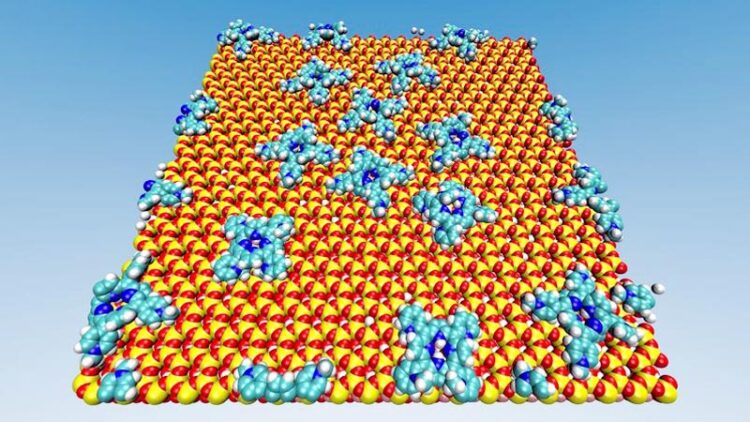Research project on machine learning for molecular systems

The energy transfer between light-absorbing molecules attached to a clay surface is at the focus of the project.
Credit: Jacobs University Bremen
Machine learning, meaning the ability to recognize important patterns in data sets and to generate solutions with the help of algorithms, is a research field of rapidly growing importance. In physics, chemistry and biology with complex molecular structures, classical machine learning is reaching its limits. In order to better understand and use molecular data, new models must be developed. This is what the DFG’s Priority Program “Use and Development of Machine Learning for Molecular Applications – Molecular Machine Learning” aims to achieve. At the end of the six-year funding period, software should be available that can be used by scientists in everyday life and enable new applications – for example in pharmacy.
“Representing and calculating the properties of molecules in a computer is anything but trivial,” said Professor Zaspel. “One of the main challenges is that we first have to generate new data instead of working with existing data as we normally do. Conceptually, that makes a big difference.” The research group applies the so-called “multi-fidelity approach” of machine learning, which combines data of varying accuracy.
Complicated physical and quantum chemical calculations are required to produce the data. “This process is complex, expensive and can take several days,” explained Professor Kleinekathöfer. “We want to develop machine learning models based on the data that make large-scale calculations faster and more efficient. That would be extremely simplifying.” This method can be used, for example, to improve special solar cells.
The tandem Kleinekathöfer and Zaspel jointly applied for the DFG project. For both of them, the attraction of the Priority Program lies not only in gaining new insights in their special fields, but also in the interdisciplinary exchange with colleagues throughout Germany. More than a dozen universities and research institutions are brought together by the program, which is coordinated by Professor Frank Glorius of the University of Münster. “We hope for fruitful synergies,” Kleinekathöfer said. At Jacobs University, the program is linked to the creation of two positions for PhD candidates. The funding volume from the DFG for the two scientists amounts to almost 500,000 euros.
All latest news from the category: Information Technology
Here you can find a summary of innovations in the fields of information and data processing and up-to-date developments on IT equipment and hardware.
This area covers topics such as IT services, IT architectures, IT management and telecommunications.
Newest articles

Sea slugs inspire highly stretchable biomedical sensor
USC Viterbi School of Engineering researcher Hangbo Zhao presents findings on highly stretchable and customizable microneedles for application in fields including neuroscience, tissue engineering, and wearable bioelectronics. The revolution in…

Twisting and binding matter waves with photons in a cavity
Precisely measuring the energy states of individual atoms has been a historical challenge for physicists due to atomic recoil. When an atom interacts with a photon, the atom “recoils” in…

Nanotubes, nanoparticles, and antibodies detect tiny amounts of fentanyl
New sensor is six orders of magnitude more sensitive than the next best thing. A research team at Pitt led by Alexander Star, a chemistry professor in the Kenneth P. Dietrich…





















